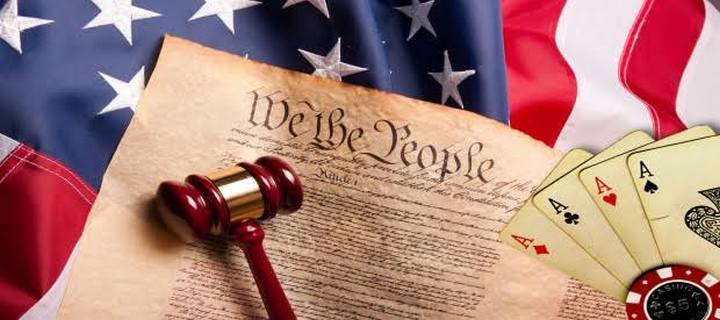History of Online Gambling Development in the USA

Since its inception, the US government has tried to put a stop to online gambling. Yet it has failed to slow, much less stop its spread. In today’s article we will look at the evolution of the online gambling industry.
The onlone gambling appeared simultaneously with the Internet. In 1994, the Caribbean nation of Antigua passed what was called the Free Trade & Processing Act, which provided licenses for online casino operators. By 1996 there were only 15 sites offering online casino games. But as other countries began to bet big by legalizing, regulating and taxing internet casino, the tide was bound to turn. As a result, by the end of 1998 there were more than 200 online casinos generating some $830 million in revenue.
None of these online casinos were based in the USA. In the USA government was doing everything it could to stamp out online casino games. Granted, in the US in the 1990’s there were land-based casinos in two dozen States, plus an assortment of gambling cruises plying the high seas, not to mention horse racing, dog racing and lotteries galore. Still, the feds decided that the best way to deal with online casinos was simply to make them illegal.
By 1999, online gambling was so prevalent that it caused the feds to put the first shot across the bows of the online gambling industry when the Internet Gambling Prohibition Act (IGPA) was floated in Congress.
A Washington political insider also took notice. Lobbyist Jack Abramoff was being paid $100,000 per month by a company called eLottery that wanted to sell state lottery tickets online. The company was founded in 1993, betting that it would be able to create an online business that could be worth billions. The problem was that no sooner had eLottery inked its first deal with an Idaho Indian tribe to begin selling lottery tickets, when the Justice Department invoked existing gambling laws to shut them down.
But the game goes on as they say and by 2001 an estimated 8 million Americans were partaking in online gambling. Despite the mostly ruthless legislation the online gaming industry would continue to flourish. As well as Antigua and a number of other Caribbean nations, other countries that legalized online gambling include Australia, France, Germany, and the UK.
In 2004, after being threatened by the Department of Justice, whose broad interpretation of the Federal Wire Act contradicted the US Court of Appeals, the world’s two most popular search engines opted to remove gambling advertising from their sites. In July 2006, the CEO of BetonSports, a company that is publicly traded on the London Stock Exchange, was detained in Texas while changing planes in route from London to Costa Rica, having been previously charged in a sealed indictment with violations of US federal laws relating to illegal gambling. That same year, Sporting bet chairman Jay Cohen was detained in New York City on a Louisiana warrant while traveling in the US. Even though the US Appeals court stated that the Wire Act doesn’t apply to non-sports betting, the US Supreme Court refused to hear an appeal of Jay Cohen’s conviction since his company offered sports bets to US citizens.
Later that same year, both the House and Senate upped the ante by passing the Unlawful Internet Gambling Enforcement Act of 2006, which made it illegal for banks or other financial institutions to make transactions with online gambling sites. In response to the enactment of the UIGEA, a number of online gambling operators opted to suspend real-money gambling with US citizens. Others, including such sites as PokerStars, Full Tilt Poker, and Bodog vowed to continue serving customers in the US.
In June 2009, the Department of Justice seized more than $34 million belonging to over 27,000 online poker players. This represented the first time that the DoJ had specifically targeted players as opposed to online gambling operators. Less than a year later, on November 22, 2010, the New Jersey State Senate became the first state to legalize online gambling. While the legally licensed operators are allowed to provide the public with online poker, casino games and online slots, they were prohibited from accepting online sports bets. They were also restricted to dealing with players who resided in New Jersey. Are you confused yet?
Three online poker operators were confused. Especially when they were indicted in 2011 for accepting wagers from US citizens. Furthermore, the indictment alleges the companies that were indicted sought to evade US law by disguising online gambling payments as purchases of merchandise. On July 31, 2012, two of the three companies indicted settled with the US Attorney for $731 million without any admission of guilt.
To date, not all online casinos are available for players from the US, but there are gaming sites that accept players from this country: Planet 7 Casino, Ignition Casino, SlotoCash Casino, Slots Plus Casino, Desert Nights Casino, Miami Club Casino, Old Havana Casino, Red Stag Casino, RoyalAce Casino, Bovada Casino, Las Vegas USA Casino, Lucky Red Casino, Sun Palace Casino, Vegas Casino Online, and others.

